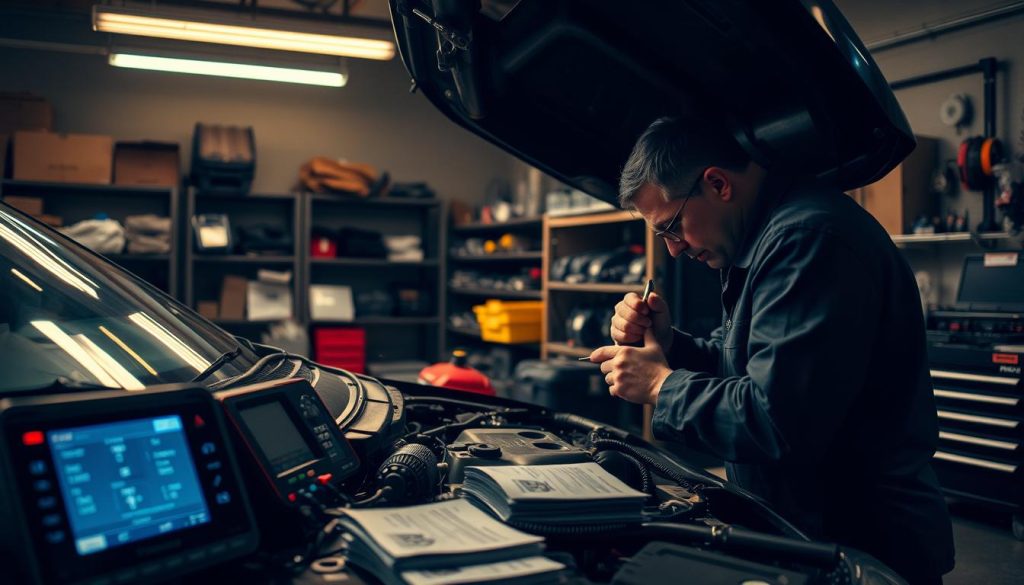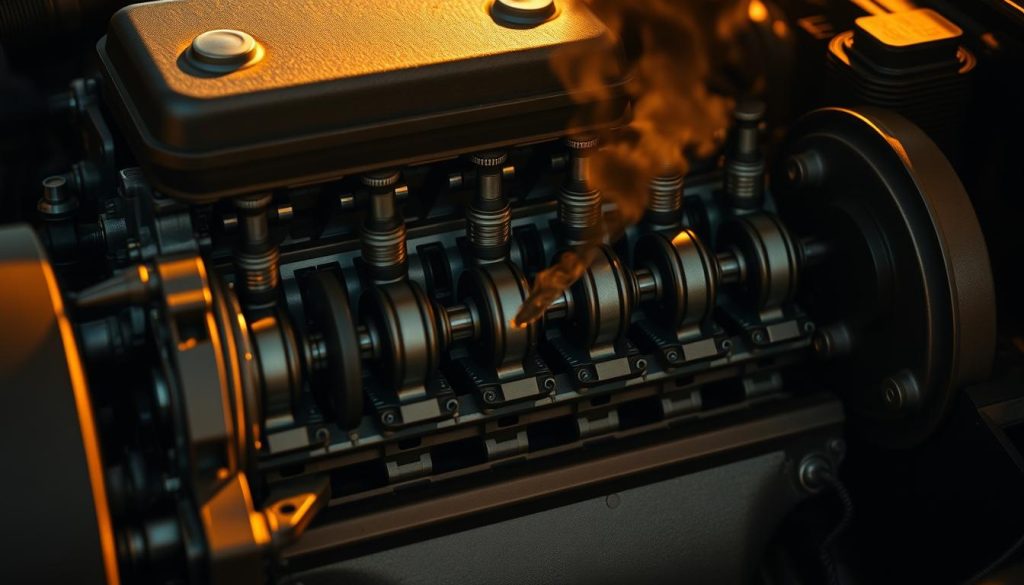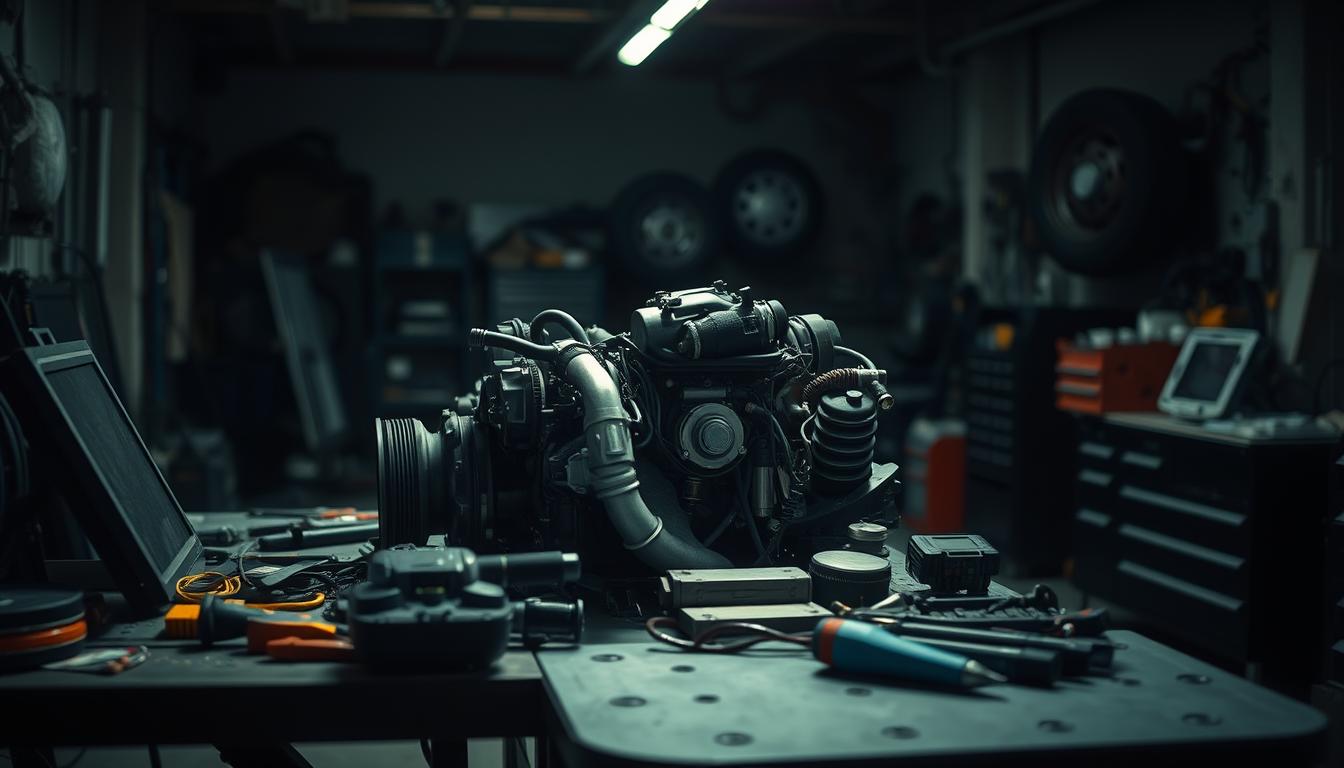Unusual engine noises can be a cause for concern. They often signal various underlying issues that need prompt attention. At Heaven Automotive, we know how crucial it is to address these problems to avoid further damage to your vehicle.
Different engine sounds can point to different problems. For example, a faulty muffler, leaking exhaust, worn engine bearings, low engine oil, or a failing torque converter. Our team is committed to offering a detailed guide on how to troubleshoot these common causes of loud engine noises.
Key Takeaways
- Identify the source of the unusual engine noise
- Check for common issues like a faulty muffler or leaking exhaust
- Monitor engine oil levels to prevent damage
- Be aware of the signs of a failing torque converter
- Consult a professional mechanic for proper diagnosis and repair
If you’re experiencing loud engine noises, don’t hesitate to contact Heaven Automotive for expert assistance. Our team is here to help you get back on the road safely.
Understanding Different Types of Engine Noises
It’s key to know the different engine sounds to find and fix problems. These noises can show minor issues or serious mechanical failures.
Each sound means something different. Some noises come from the engine’s parts, while others might be from the fuel or cooling systems.
Knocking and Pinging Sounds
Knocking and pinging sounds usually mean problems with the fuel system or ignition. These can happen if you use the wrong fuel or if the engine’s timing is off. Ignoring these sounds can cause serious engine damage.
Grinding and Scraping Noises
Grinding and scraping noises usually mean worn or damaged engine parts. These sounds can signal serious mechanical issues that need quick attention to avoid more damage.
Hissing and Whistling Sounds
Hissing sounds often point to leaks in the cooling or vacuum system. These leaks can cause big problems if not fixed fast, leading to overheating or other issues.
Clicking and Tapping Noises
Clicking and tapping noises can be from valve train problems or issues with the hydraulic lifters. These sounds might mean you need to maintain or repair these parts to avoid more damage.
If you hear strange engine noises, it’s important to find the right fix. At Heaven Automotive, our experts can help you figure out and fix engine noise problems. Hire us to make your vehicle run smoothly and efficiently.

Noisy Engine Troubleshooting: Component-Specific Issues
A noisy engine can point to several problems. It’s key to check different parts that might be causing the sound.
Worn or Damaged Timing Belt Problems
A timing belt that’s worn or damaged can make slapping or grinding noises. It’s important to look for wear or damage on the timing belt. If you find any, replacing it can fix the noise.
Faulty Lifters and Valve Train Noise
Faulty lifters can cause clicking or tapping sounds. Valve train noise often means worn or damaged parts. Checking and replacing these parts can quiet down the engine.
Bearing Failures in the Engine
Bearing failures lead to grinding or rumbling noises. Finding and replacing failed bearings is key to avoid more damage.
Low Oil Level or Pressure Issues
Low oil levels or pressure can cause rubbing or grinding sounds. This is because there’s not enough lubrication. Checking oil levels and ensuring proper lubrication can solve these problems.
If you’re dealing with constant engine noises, getting help is wise. At Heaven Automotive, our team can find and fix specific problems. Hire us to repair your vehicle and ensure your safety on the road.
How Engine Misfires Contribute to Unusual Noises
Engine misfires can make your car sound strange. They often point to problems with fuel or ignition. If not fixed, these issues can get worse.

Identifying an Engine Misfire
Look for signs like rough idling or a dim check engine light. These mean your engine might not be working right.
Fuel and Ignition System Issues
Fuel and ignition problems often cause misfires. Faulty fuel injectors or ignition coils can mess up your engine’s work.
Damaged Spark Plugs and Wires
Worn-out spark plugs or damaged wires can also cause misfires. They stop fuel from igniting properly.
Long-term Consequences of Ignoring Misfires
Ignoring misfires can damage your car’s catalytic converter or engine parts. Fixing them quickly is key to avoid expensive repairs.
If your car misfires or makes odd noises, get it checked by a pro. At Heaven Automotive, our skilled team can fix engine misfires fast. Hire Heaven Automotive to keep your car running well and prevent damage.
Conclusion: When to Seek Professional Help for Engine Noise
Car owners can tackle some engine noises on their own. But, complex issues need a pro’s touch. If you’re not sure, it’s best to call a mechanic.
At Heaven Automotive, our skilled team can tackle many engine problems. This includes noisy engine issues. If your engine is making strange sounds, we’re here to help.
Ready to get your car fixed? Hire Heaven Automotive for top-notch service. Our experts will make sure your vehicle is safe and runs well.

